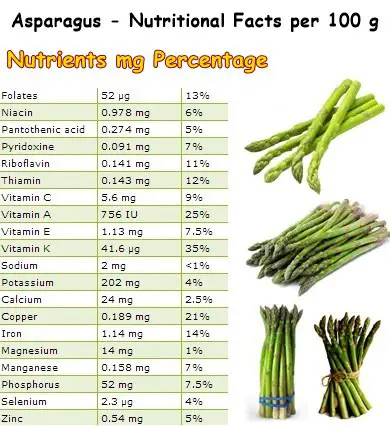Garden asparagus (Asparagus officinalis) is an appetizing spring vegetable, suitable for high class dishes and fancy events. But more important, it is a healthy vegetable with great health benefits.
Traditionally, asparagus was used to treat various gastrointestinal disorders such as irritable bowel syndrome and dropsy. Being a good source of vitamins A, B1, B2, B9 and K, it contributes to maintaining good eyesight, ensures good energy levels and supports blood coagulation processes.
Moreover, asparagus boasts great anti-inflammatory properties as well as a strong antioxidant activity, protecting cells from damage caused by harmful reactive oxygen molecules called free radicals and reducing inflammation levels in the body, contributing to an overall good health. It is a good source of dietary fiber and supports kidney function.

What does asparagus look like?
As you may already know, asparagus is a spear-like, thin, green vegetable of a more or less woody texture. Its distinguishing feature is its tiny, scale-like leaves narrowing towards the pointy, green-purple tops. Asparagus may range in length from 25-156 cm (9.8-39.4 inches).
There are also varieties of white asparagus, purple asparagus and a pink asparagus variety.
What does asparagus taste like?
Asparagus has a distinct flavor that pairs well with garlic, lemon, olive oil and vinegar. If young, the spears are tender and have a mild flavor. If mature, asparagus has a strong, bitter flavor and a hard, woody texture which might spoil one’s culinary experience.
How to choose good asparagus
When choosing asparagus, looks are quite important because they offer you important information about the quality of the vegetable. Always look for straight, firm stems of a bright green color. Make sure the tops have tightly-wrapped leaves and have not flowered. Purple smudges on the tip are a good indicator of quality. This goes for all fruits and vegetables: you might want to avoid wilted, bruised or mushy plants.
Read also : Can You Eat Asparagus Raw?

What are the benefits of Asparagus?
Find out below what are the most notable 6 nutrition facts and health benefits of asparagus:
Rich in antioxidants
Asparagus contains lutein, zeaxanthin, cryptoxanthin, carotenes and flavonoids, as well as chlorophyll which counteract the damaging effects of free radicals, delay aging signs and reduce chronic disease risks by maintaining healthy, fully functional cells. Lutein and zeaxanthin are particularly good for vision and are shown to protect the retina from damage caused by the free radicals in blue light especially.
Anti-inflammatory activity
The vitamin K in asparagus reduces interleukin-6 levels. Interleukin-6 is a glycoprotein believed to cause inflammation contributing to higher coronary heart disease and cancer risks. A sufficient intake of the vitamin from dietary source can help reduce inflammation levels in the body and have us enjoy a lower risk for various chronic, inflammatory diseases.
Good source of fiber
Asparagus contains 2.1 g of fiber/100 g of raw sprouts. Dietary fiber prevents fat from the food we eat from being fully absorbed along with other nutrients at the intestinal level. This indirectly contributes to lowering LDL (bad) cholesterol levels. Moreover, the fiber in fruits, vegetables and cereals maintains colon health by promoting easy, regular bowel movements.
This not only relieves constipation, but also prevents toxic compounds from waste from accumulating in the colon, which is said to reduce colon cancer risks. However, avoid eating asparagus either in large amounts or too often if you are struggling with irritable bowel syndrome because the insoluble fiber in the vegetable may cause the condition to worsen.

Great source of vitamin K
Asparagus provides 35% of the RDA of vitamin K per 100 g. As a result, it supports blood coagulation, protects against oxidative stress and prevents frequent nosebleeds and easy bruising. However, if you are taking anticoagulants, it might be best to first talk to your doctor about what a safe intake of vitamin K is for you because the nutrient can make anticoagulant medication less effective, potentially encouraging blood clots.
Good B vitamins content
Asparagus contains good amounts of thiamine, riboflavin and folate, three essential B group vitamins. Thiamine (or vitamin B1) supports nervous system activity by ensuring the health of our nerve cells. Riboflavin (or vitamin B2) prevents cracked or dry skin, especially at the corners of the mouth and other unpleasant skin problems such as dry scalp or dermatitis. Folate (vitamin B9) prevents spinal cord defects in newborns. Pregnant women should increase their intake of folate-rich foods such as asparagus.
Detox food
Asparagus is a great detox food, supporting kidney function and the body’s natural detoxification mechanisms. Moreover, a study conducted by the Medical Center at the University of Maryland recommends asparagus as an excellent diuretic for treating edema, a condition characterized by water retention causing discomfort, pain and swollen lower extremities (swollen feet, calves) and abdomen. Also, asparagus has no caffeine and no cholesterol, making it further good for cardiovascular and general health.
Side effects of eating asparagus
Eating asparagus causes urine to smell very bad. The foul odor is caused by sulfurous compounds which break down during digestion and are then eliminated through urine. Although the smell is more odoriferous in some people than others, remember that this is just the result of eating asparagus. How to get rid of the bad urine odor caused by eating asparagus? Just drink plenty of water. This will send you to the bathroom as often as needed until there is no more asparagus in your system.
